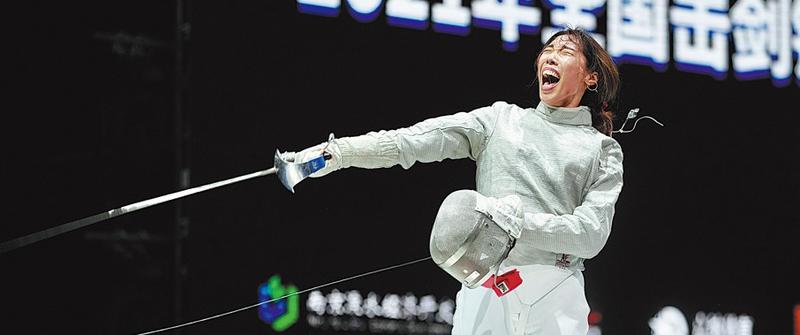 This undated file photo shows Chinese fencer Shao Yaqi. She is ranked fourth in the world and hopes to contend for an Olympic medal in the women's individual sabre event at the Tokyo Games. (PHOTO PROVIDED TO CHINA DAILY)
This undated file photo shows Chinese fencer Shao Yaqi. She is ranked fourth in the world and hopes to contend for an Olympic medal in the women's individual sabre event at the Tokyo Games. (PHOTO PROVIDED TO CHINA DAILY)
A month out from the Tokyo Olympics, China's fencing team is determined to "seize all opportunities" to stand on the highest podium at the Games.
"Our goal is to have a better result than the Rio Games. The team has prepared with a different focus for each event. The Olympics are always full of surprises, so we asked the fencers to enjoy and seize every opportunity to win," Wang Haibin, president of the Chinese Fencing Association, told Xinhua in a recent interview.
"Compared with the London Olympics, we didn't do well in Rio. We started forming the team in 2017 as a new Olympic cycle began. We are now making progress, with the emergence of youngsters and the return of veterans such as Xu Anqi."
China's fencers bagged two golds and a bronze at the London Olympics, compared to one silver and a bronze in Rio.
It also takes longer for our fencers to reach peak intensity in matches. It has something to do with their personalities. The European and American fencers can launch themselves into matches full throttle. The Olympics have really high intensity, so there's no time for athletes to adjust to peak condition after the match starts.
Wang Haibin, president of the Chinese Fencing Association
Nine of the 13-strong squad for the Rio Games were Olympic rookies. Team China will have an even younger squad in Tokyo, with only two of the 15 fencers having competed at previous Games.
The challenges presented by the COVID-19 pandemic have added an extra layer of difficulty for the squad.
Qualification for the Games was postponed for a year due to the pandemic, and only concluded in late April this year.
"We thought other teams wouldn't be able to train systematically and properly like we did during the pandemic," said Wang. "But we were proved wrong at the Olympic qualification tournaments in Russia and Hungary.
"Fencing is a sport that you can only improve yourself by competing against other fencers. As far as I'm aware, despite some official competitions being canceled, fencing clubs in Europe and North America still play against each other very often. So they were able to compete against fencers from different countries and regions and with different styles.
ALSO READ: China's preparation for Tokyo Olympics in order amid epidemic
"It also takes longer for our fencers to reach peak intensity in matches. It has something to do with their personalities. The European and American fencers can launch themselves into matches full throttle. The Olympics have really high intensity, so there's no time for athletes to adjust to peak condition after the match starts."
China is qualified in all three fencing disciplines-foil, sabre and epee. In the team events, China will compete in the women's epee, women's sabre and men's epee. The 12 fencing gold medals up for grabs in Tokyo are spread over six individual and six team events.
My goal of participating in these events is to prepare as best I can for the Tokyo Olympics. My body has a big reaction to intense duels. Many problems have been exposed and I'm aiming to make some changes in the remaining time before the Olympics.
Xu Anqi, China's epee fencer
"Among the 42 teams who qualified for Tokyo, only Russia, Italy and the United States managed to participate in all 12 events," Wang told Xinhua. "China ranks sixth in terms of the number of fencers at the Tokyo Olympics.
"We are not able to compete with the powerhouses in all events yet, but we will focus on the ones we are best at."
Team China's best gold-medal hope in Tokyo is its world No 1 women's epee squad. Wang also believes the men's epee team, which ranks sixth in the world, has the potential to win a medal, while world No 4 Shao Yaqi will be hopeful of earning a podium place in the women's individual sabre.
Veteran Xu Anqi, who won women's epee team gold and silver in London and Rio respectively, will compete for her nation once again in Tokyo. The 29-year-old has been fine-tuning her preparations at domestic events, and admits to some concerns over her fitness.
"My goal of participating in these events is to prepare as best I can for the Tokyo Olympics. My body has a big reaction to intense duels. Many problems have been exposed and I'm aiming to make some changes in the remaining time before the Olympics," Xu said at the National Fencing Championship in Chengdu, Sichuan province last month.
"The time is really limited and I need to push myself. We will certainly reach our physical limits at the Tokyo Olympics and we will face many intense bouts. So we need to prepare ourselves for all kinds of difficulties.
READ MORE: China claims second fencing gold at Asiad
"Just look at the competitors at the national championship-many were born after 2000. It's not easy for us 'old' fencers, but I'm still satisfied with my performance so far and my attacks are still very aggressive."


